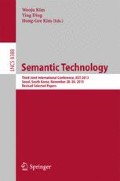Abstract
Interlinking Asian resources on the Web is a significant, but mostly unexplored and undeveloped task. Toward the goal of interlinking Asian online resources effectively, we propose a novel method that links Chinese and Korean resources together on the basis of a new machine translation system, which is built upon a frequency-based model operated through the Google Ngram Viewer. The study results show that Chinese characters can be mapped to corresponding Korean characters with the average accuracy of 73.1 %. This research is differentiated from the extant research by focusing on the Chinese pronunciation system called Pinyin. The proposed approach is directly applicable to voice translation applications as well as textual translations applications.
Access this chapter
Tax calculation will be finalised at checkout
Purchases are for personal use only
References
Hong, S.G., Jang, S., Chung, Y.H., Yi, M.Y.: Interlinking Korean resources on the web. In: Takeda, H., Qu, Y., Mizoguchi, R., Kitamura, Y. (eds.) Semantic Technology. LNCS, vol. 7774, pp. 382–387. Springer, Heidelberg (2013)
Huang, J.-X., Choi, K.-S.: Chinese-Korean word alignment based on linguistic comparison. In: ACL’00 Proceedings of the 38th Annual Meeting on Association for Computational Linguistics, pp. 392–399 (2000)
Lee, Y.: Research About Korean Chinese Common Words. Samyoung-sa, Seoul (1974)
Chen, Z., Lee, K.-F.: A new statistical approach to chinese pinyin input. In: ACL’00 Proceedings of 38th Annual Meeting on Association for Computational Linguistics, pp. 241–247 (2000)
Gillam, R.: Unicode Demystified : A Practical Programmer’s Guide to the Encoding Standard. Addison-Wesley, Boston (2003)
Internet World Stats. http://www.internetworldstats.com/
Na, S.H., Jung, H.Y., Yang, S.I., Kim, C.H., Kim, Y.K.: Big data for speech and language processing. Electronics and Telecommunications Trends, pp 52–61 (2013)
Acknowledgements
This work was supported by the IT R&D program of MSIP/KEIT. [10044494, WiseKB: Big data based self-evolving knowledge base and reasoning platform]
Author information
Authors and Affiliations
Corresponding author
Editor information
Editors and Affiliations
Rights and permissions
Copyright information
© 2014 Springer International Publishing Switzerland
About this paper
Cite this paper
Kim, E.J., Yi, M.Y. (2014). Toward Interlinking Asian Resources Effectively: Chinese to Korean Frequency-Based Machine Translation System. In: Kim, W., Ding, Y., Kim, HG. (eds) Semantic Technology. JIST 2013. Lecture Notes in Computer Science(), vol 8388. Springer, Cham. https://doi.org/10.1007/978-3-319-06826-8_6
Download citation
DOI: https://doi.org/10.1007/978-3-319-06826-8_6
Published:
Publisher Name: Springer, Cham
Print ISBN: 978-3-319-06825-1
Online ISBN: 978-3-319-06826-8
eBook Packages: Computer ScienceComputer Science (R0)

